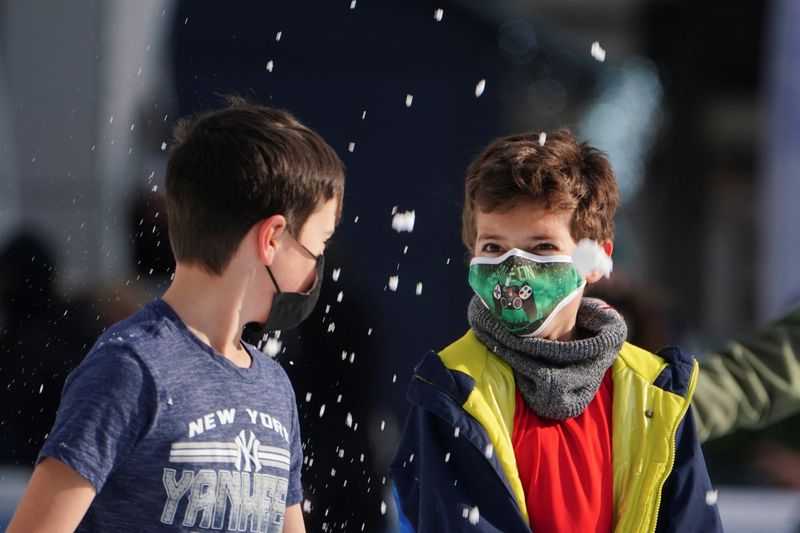By Nancy Lapid
(Reuters) - The following is a summary of some recent studies on COVID-19. They include research that warrants further study to corroborate the findings and that has yet to be certified by peer review.
Childrens' noses defend less well against Omicron
The Omicron variant may be more efficient at infecting children through the nose than previous versions of the coronavirus, a small study suggests.
Earlier in the pandemic, children's noses had been less welcoming to the virus that causes COVID-19 than adults' noses. Studies of the original SARS-CoV-2 and some of its variants found the virus was met with stronger immune responses in the cells lining young noses than in adults' nasal-lining cells, and it was less efficient at making copies of itself in children's noses. But recent test-tube experiments mixing the virus with nasal cells from 23 healthy children and 15 healthy adults found the antiviral defenses in kids' noses "was markedly less pronounced in the case of Omicron," researchers reported on Monday in PLOS Biology https://journals.plos.org/plosbiology/article?id=10.1371/journal.pbio.3001728. They also report that Omicron reproduced itself more efficiently in childrens' nasal-lining cells compared to both Delta and the original virus.
"These data are consistent with the increased number of pediatric infections observed during the Omicron wave," the researchers wrote, while calling for additional studies.
Smell problems may predict memory problems after COVID-19
Severity of smell dysfunction after infection with the coronavirus may be a better predictor of long-term cognitive impairment than overall severity of COVID-19, according to an Argentinian study.
Researchers studied a random sample of 766 people over age 60, roughly 90% of whom had been infected with the virus. Physical, cognitive and neuropsychiatric tests performed three-to-six months after infection showed some degree of memory impairment in two-thirds of the infected participants. After taking individuals' other risk factors into account, severity of loss of smell, known as anosmia, "but not clinical status, significantly (predicted) cognitive impairment," the researchers reported on Sunday at the Alzheimer's Association International Conference 2022 https://aaic.alz.org/overview.asp, held online and in San Diego.
"The more insight we have into what causes or at least predicts who will experience the significant long-term cognitive impact of COVID-19 infection, the better we can track it and begin to develop methods to prevent it," study leader Gabriela Gonzalez-Aleman of Pontificia Universidad Catolica Argentina in Buenos Aires said in a statement.
Vaccine mandates linked to better nursing-home staffing
In U.S. states that mandated COVID-19 vaccines for nursing home staff, the rules achieved the desired effect and did not lead to mass resignations and or staffing shortages, a study found.
In states without such mandates, however, nursing homes did experience staff shortages during the study period, researchers reported on Friday in JAMA Health Forum https://jamanetwork.com/journals/jama-health-forum/fullarticle/2794727. Data collected from mid-June to mid-November 2021 from the National Healthcare Safety Network showed that in 12 states with COVID-19 vaccine mandates, staff vaccination coverage rates ranged from 78.7% to 95.2%. States without mandates "had consistently lower staff vaccination coverage throughout the study window" and "higher rates of reported staff shortages throughout the study period," according to the report.
"The association of mandates with higher vaccination coverage stands in contrast with prior efforts to increase COVID-19 vaccine uptake among nursing home staff through education, outreach, and incentives," the researchers said. They added that the data "suggests that the fear of massive staffing shortfalls owing to vaccine mandates may be unfounded."
Click for a Reuters Global COVID-19 Tracker https://graphics.reuters.com/world-coronavirus-tracker-and-maps/index.html and for a Reuters COVID-19 Vaccination Tracker https://graphics.reuters.com/world-coronavirus-tracker-and-maps/vaccination-rollout-and-access.
(Reporting Nancy Lapid and Shawana Alleyne-Morris; Editing by Bill Berkrot)
